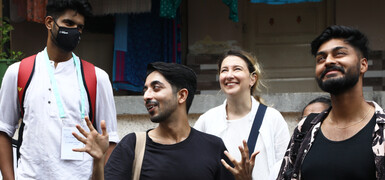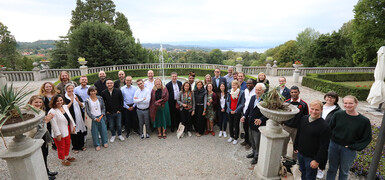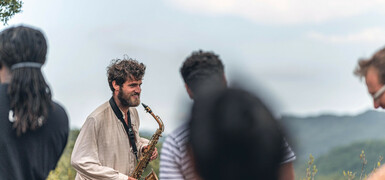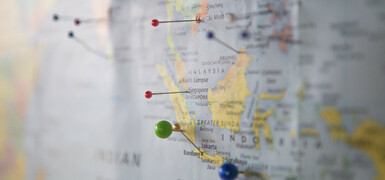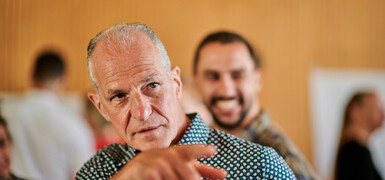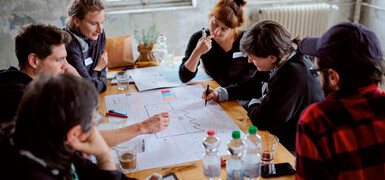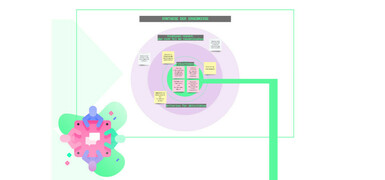
Creating Space for Innovation through Decentralization
How can we support the shift from a centrally organized to a decentralized network?
A dynamic and resilient alumni network that can spark innovation needs space, member ownership, and trust. But this can be difficult to achieve in centrally organized networks. Most foundations develop their alumni networks in a “hub & spoke” model with a foundation-based team at its center. Our experience shows that developing towards a member-driven, multi-community network needs a clear strategic decision and the will to let go control. How can this transitional step be achieved?
The Bosch Alumni Network shares some of its successful approaches.
A centralized network often relies on a “hub & spoke” model. Think of a bicycle wheel, where several spokes are connected by a strong central hub, or how airline connections are organized. This is also the model for many people-based networks, such as alumni networks.
In a hub & spoke network, a well-connected hub fosters strong ties to individual network-members and centrally steers communication and cooperation. This setup provides network “owners” with a strong sense of control, but they also squander a lot of potential creativity and innovation. A multi-community network is decentralized, connecting several smaller communities built around e.g., specific topics or fields. This model requires individual members to take ownership of the communities and provides the space necessary for experimentation and innovation. However, it also leaves network owners with much less overall control and ability to plan outcomes, which is why many network owners instinctively shy away from this kind of model.
Empowering members as Impact Field Hosts
The Bosch Alumni Network uses various approaches to distribute ownership amongst its members and to drive decentralization. These member-organized communities include groups around the original programs of the Robert Bosch Stiftung, geographic areas, sectors, and collaborations around specific topics or fields of action. Within the Bosch Alumni Network those fields of action are called “Impact Fields” and serve as junctures for exchange and collaboration across the network. They can help build connections between members with different backgrounds but working on the same topic. In 2021, the new role of Impact Field Host was established in support of building communities of practice around certain topics.
Each Impact Field is facilitated by a hosting team of up to two members, who hold their positions for nine months. Together with the members working in that field, hosts are encouraged to shape the thematic focus, activities, and means of communication for their respective fields, thus building a sense of ownership at both the host and member levels. Activities developed by and for the members have the potential to strengthen the network in a sustainable way. When members can be co-creators of the network and see the network itself as a space for innovation, they are willing to contribute time, knowledge, and energy to the development of the network.
The Impact Fields of the Bosch Alumni Network range from “Climate Change” and “Diversity & Inclusion,” to “Migration,” “Participatory Governance” and more. Lilian Daphine Lunyolo, Lubor Jusko, and Greta Frankenfeld became Impact Field Hosts in 2021 and shared their motivations and hopes with us in regards to their new roles.
Climate Change
"We both work on the topic of climate change. Serving as Impact Field Hosts enables us to not only share our professional experience with fellow members, but also to catalyze and facilitate cooperation to address climate change issues in communities around the world.
Impact Fields are a great way to help raise awareness about the many opportunities that the Bosch Alumni Network has to offer. We hope that the momentum and engagement among our members will also translate into impact in their own communities outside of the Bosch Alumni Network. We can already see how the community around the topic of climate change is growing within the Bosch Alumni Network. We hope that by the end of our tenure as hosts, members will have enhanced their knowledge about climate change, identified gaps in climate action, and are inspired to contribute to collaborative climate action."
Lilian Daphine Lunyolo & Lubor Jusko
Hosts of the Impact Field “Climate Change”
Diversity & Inclusion
"I didn’t have an “official” role in the Bosch Alumni Network before, but becoming an Impact Field Host sounded like a great opportunity to meet interesting people working on a subject that is fundamental to us all. Furthermore, it is great chance to experiment with online Feminist Popular Education.
My aim is to facilitate an active, inclusive, and co-creative community experience, as well as to promote practical learning in self-care and diversity in caring. With that, I hope to generate reflections as well as systemic approaches, methodologies, and strategies to increase awareness about the importance of diversity. I hope that my contribution will help members’ develop a sense of belonging, and I see my role as an active facilitator in that. Even when standing in front of an open door, we sometimes need someone to invite us in before we can feel at home.
The Diversity & Inclusion community is growing, but it still needs a lot of nurturing. I think there is a real need and a real interest to work on this issue."
Greta Frankenfeld
Host of the Impact Field “Diversity & Inclusion”
“Analyses show that perceived ownership and identification with the network as well as norms of accessibility, trust and reciprocity are important drivers of members’ engagement and the self-reinforcing nature of the network. All of this is difficult to establish on top of a relationship that will unavoidably also reflect an uneven distribution of resources and tasks, principal-agent-problems, and limited legal and organizational opportunities for real co-ownership. Given that power asymmetries are widely recognized challenges in the philanthropic sector, one can expect that such an approach will also be sensible for other philanthropic institutions that wish to engage in a network approach.”
From:
“Impact-oriented networks in the context of philanthropy: An evaluation of the Bosch Alumni Network” (2020), Social Entrepreneurship Center, Vienna University of Economics and Business
Do you want to discuss this method and our learnings in more depth? Please get in touch with:
Darius Polok
Managing Director
darius.pook@iac-berlin.org
